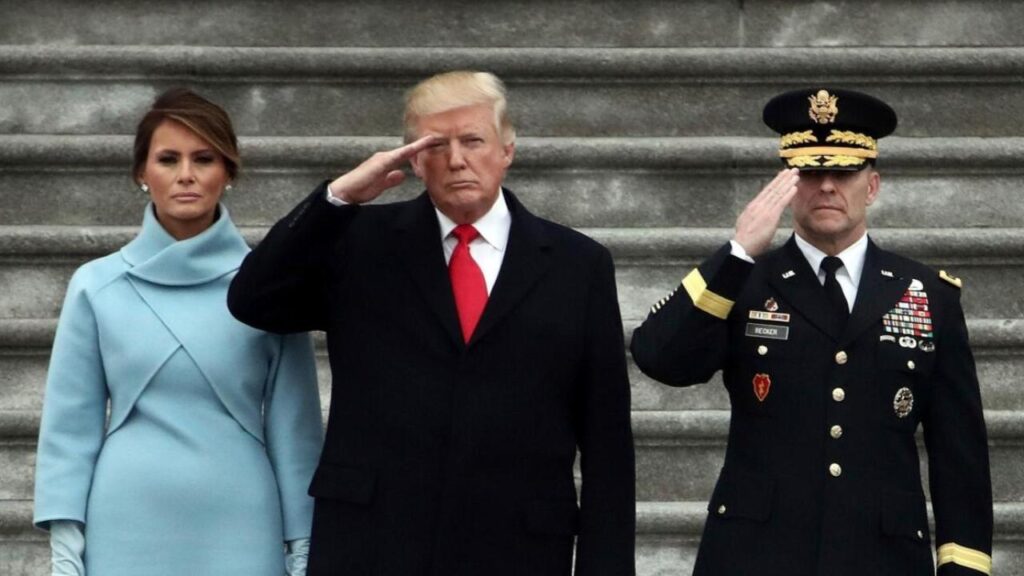If you’ve been hearing the phrase “America First” tossed around lately, you’re not alone. But something’s changed. What once stood for non-intervention and putting domestic priorities first has morphed—according to Donald Trump himself—into whatever he says it means. That declaration is causing concern, not just among his critics, but even among his traditional allies.

‘America First’ Now Means Whatever Trump Says
| Takeaway | Stat / Statement |
|---|---|
| Trump redefined the slogan | “I created it, I define it” |
| Increasing foreign policy confusion | Support for Israel’s strikes contradicted isolationist expectations |
| Project 2025 proposes centralized executive power | Military deployment in civilian matters under review |
emocracy relies on predictable rules, not personalized proclamations. If “America First” becomes synonymous with “Trump First,” we’re looking at more than a policy shift—we’re facing an ideological pivot with global consequences.
When a Slogan Becomes a Personal Doctrine
Earlier this week, Trump told The Atlantic that since he “invented” the term “America First,” only he can determine what it means. That might seem like classic Trump braggadocio, but the implications go deeper.
Historically, “America First” symbolized a restrained foreign policy, born from the 1940s isolationist movement. In 2016, Trump repurposed it to reject globalism and promote domestic industry. But now? It’s a moving target. “America First now means whatever I say it means,” Trump said.
That shift from ideology to personal fiat is alarming political scientists who see echoes of authoritarian regimes, where the leader’s word becomes policy.
When Priorities Get Personal
Trump’s latest stances are straining his own coalition. MAGA influencers like Steve Bannon and Tim Pool have criticized his support for Israel’s military actions against Iran, saying it violates the non-interventionist roots of the original “America First.”
Yet Trump remains unfazed. His aides have floated ideas like buying Greenland, taking back the Panama Canal, and even exiting NATO. None of these align with any consistent strategic doctrine—they align with Trump’s instincts. “This isn’t about left or right,” said former NSC advisor Fiona Hill. “It’s about whether foreign policy is made by national interest or one man’s impulses.”

The New Rules: Transactional and Imperial
Under what some are calling “America First 2.0,” we’re seeing:
- Transactional Alliances: Trump seeks trade partners based solely on economic returns, shunning long-term diplomacy.
- Expansionist Whiffs: He’s entertained colonial-era ideas like territorial acquisitions.
- Institutional Distrust: Withdrawal from global bodies like the WHO, slashing U.N. contributions, and bypassing traditional diplomacy.
That’s creating friction abroad and uncertainty at home. Military leaders worry about long-term alliances. Economists warn that global instability threatens U.S. markets.
Domestic Fallout: Power Consolidation in Focus
Domestically, the personalization of “America First” feeds into broader concerns about executive overreach. Project 2025, a transition plan drawn up by Trump-aligned think tanks, calls for purging career civil servants, centralizing executive authority, and even rethinking the Department of Justice’s independence.
Critics argue these moves echo authoritarian trends, where government agencies are used to settle political scores. Former DOJ officials have called the plans a “blueprint for autocracy.” As someone who covered Trump’s first term and now his second, I’ve seen firsthand how governing by instinct, rather than principle, can upend decades of U.S. policy.
Global Impact: Allies on Edge
Traditional allies are also rattled. European diplomats have expressed concern about the U.S. walking away from NATO, the climate accords, and other multilateral agreements. Without a steady doctrine, they’re unsure whether America is friend or foe. Even Japan and Australia, longtime partners, are reevaluating their defense strategies amid the uncertainty.
What to Watch For
- Doctrine or Chaos? Will Trump clarify a consistent vision, or continue governing by gut?
- Institutional Pushback: Will Congress or the courts step in to check growing executive power?
- Base Fracture: Could internal dissent within MAGA finally splinter the coalition?






